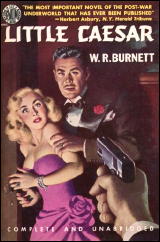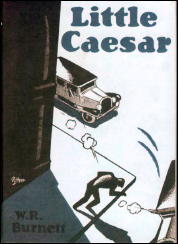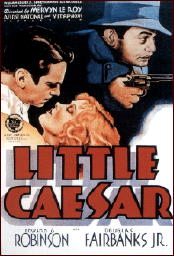Fri 4 Dec 2009
A 1001 MIDNIGHTS review: W. R. BURNETT – Little Caesar.
Posted by Steve under 1001 Midnights , Reviews[2] Comments
by Ed Gorman & Bill Pronzini:
W. R. BURNETT – Little Caesar. Alfred A. Knopf, hardcover, 1929. Paperback reprints include: Avon #329, 1951; Bantam Giant A1871, 1959; Signet, 1972. Film: First National, 1931 (with Edward G. Robinson, Douglas Fairbanks Jr., Glenda Farrell; director: Mervyn LeRoy).

“Mother of God, is this the end of Rico?”
Few movie lines have endured as long and as well as the signature line of Burnett’s Little Caesar screenplay. He ended the novel on which the movie was based with virtually the same line. Burnett mastered an idiom and rhythm that, while essentially literary, spoke directly to the masses.
Caesar is serious and detailed, charting the rise and fall of a Chicago gangster against a backdrop of political and social turmoil. As in his other great novel, High Sierra, Burnett means to treat his headline subject with novelistic scrutiny.
In a bittersweet interview given near the end of his life, Burnett complained that he was often praised for his “plotting,” a compliment he refused on the grounds that he never plotted, but let his characters carry the story to its own organic end.

To a large degree, Burnett was correct. In some parts, Little Caesar is a novel of manners, and the overriding concern is not for the story per se but rather how certain events affect the characters who weave in and oat of the book.
Little Caesar is too often used as a bludgeon with which to decimate The Godfather. The books should not be compared. Mario Puzo wrote a fine romance, perhaps a novel of the first rank, after all. Burnett, however, wrote a treatise that was part sociology, part character sketch, part comedy and most of all, a naturalistic reflection of the squalid Chicago slums of the time.
Caesar remains fresh, potent, funny, tragic. Rico, its center, like an great characters, eludes final understanding.
The 1930 film version with Edward G. Robinson and Douglas Fairbanks Jr. is likewise a classic. Robinson’s portrayal of Rico has often been imitated (by himself as well as others, notably in his role in Key Largo) but never surpassed.

Burnett’s other major crime novel is The Asphalt Jungle (1949), the film version of which — starring Sterling Hayden and Sam Jaffe — has been called “the gangster film of the Fifties.”
Minor but excellent novels are Dark Hazard (1933), The Quick Brown Fox (1942), and Vanity Row (1952). Among Burnett’s numerous screenplays are those for This Gun for Hire (1941) and the 1955 remake of High Sierra starring Jack Palance, I Died a Thousand Times.
———
Reprinted with permission from 1001 Midnights, edited by Bill Pronzini & Marcia Muller and published by The Battered Silicon Dispatch Box, 2007. Copyright © 1986, 2007 by the Pronzini-Muller Family Trust.
Editorial Comment: Novels by W. R. Burnett previously reviewed on this blog, both by Dan Stumpf, are Dark Hazard and Romelle.
In his comment following the former, David Vineyard suggests that while “Burnett is seldom ranked with Hammett, Chandler, and Cain […] at times he was their equal, and I think sometimes surpassed Cain.” He goes on to say that “… maybe that holy trinity of the hard boiled school should be a quartet.”
I can’t quarrel with the sentiment, but the fact is, barely no one remembers Burnett today (and Cain is slipping fast). But this fact, if true, leads to the immediate question:
Can you think of another author as outshadowed as Burnett by the films based on the novels he wrote? The films are seared into the memories of everyone who’s watched them, but how many of those who’ve seen the movies have any idea who wrote the books?
December 4th, 2009 at 9:57 pm
Steve
Actually right now I would say Cain falls into the same category as Burnett, though not as extreme, and there has been a tendency to revivals of his work every fifteen to twenty years which may yet save him.
Other writers whose film adaptations (or television)outstrip their books would have to include Earl Derr Biggers and Charlie Chan, Ian Fleming, Erle Stanley Gardner, and Alistair Maclean. But none of them to quite the extent of Burnett, and all of them still have a fairly wide readership.
A handful never got the recognition, like Charles G. Booth who wrote two books that became cult films — The General Died at Dawn and Johnny Angel (based on Mr. Angel Comes Aboard). Like Burnett he was also a screenwriter and an Oscar nominee, but the film versions of his work are much better known than the actual work.
Ironically Burnett is almost as well known as a screenwriter as a novelist. But I do think he is unique in this category, less well known as a writer than for the adaptations of his work to the screen. But then somewhere there is someone surprised to find out that Romeo and Juliet was a play or that A Christmas Carol was a book, and did you know Walt Disney didn’t create Pinnochio?
Sometimes all you can do is sigh in resignation. After all, when is the last time they put on a production of “Everybody Comes to Rick’s” ?
December 7th, 2009 at 6:48 am
Burnett’s LITTLE CAESAR is much much better than the clunky film they made of it, mainly because Burnett let Rico run the story, which proceeds quite well, rather than the simplistic “rise & fall” theme of the film.